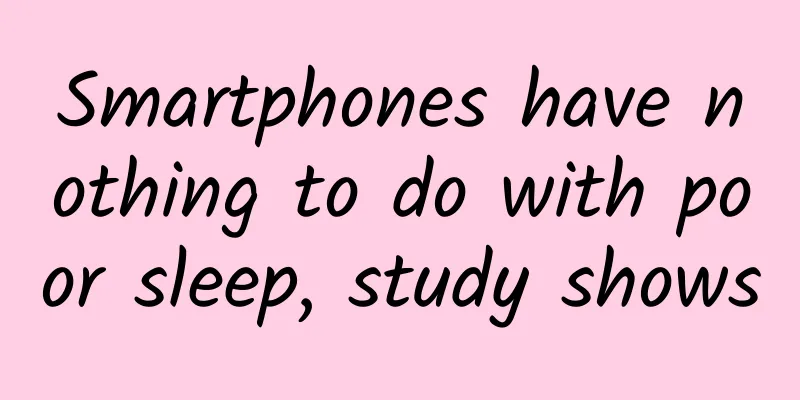Smartphones have nothing to do with poor sleep, study shows

|
At present, smartphones have been proven to be our best partners, and most people are used to playing with their phones before going to bed. In fact, according to a recent study in the United States, 71% of people's sleep quality is related to smartphones. Most people play with their phones before going to bed, 13% of the surveyed users play while lying down, and 3% play all night. Will smartphones harm our health? With the rise of smart mobile devices, this issue has attracted attention from the outside world. It’s widely believed that insomnia and other sleep problems may be linked to lying in bed staring at our smartphone screens, as these smartphone screens emit large amounts of blue light, which deprives our brains of a restful rest. As this idea spreads, people begin to believe that smartphones are the main reason for our poor sleep, but in fact this is not the most important factor. Of course, we are not saying that playing with mobile phones in bed has no effect at all, but the impact is not as serious as we think. Shining phone screens aren't something we should be worrying about all night long, as they aren't a major factor in disrupting our sleep, a new study suggests, and it's a theory that many professionals are buying into. Jerome Siegel from the University of California, Los Angeles and Gandhi Yetish from the University of New Mexico published an article in Current Biology, in which they used simple examples to prove that the impact of smartphones on human sleep quality is actually not that great. The two researchers studied indigenous peoples in areas such as the Hadza in Tanzania, the Tsimane in Bolivia, and the Kalahari Desert in South Africa, where indigenous peoples generally make their livings by hunting and gathering. The researchers tracked 94 indigenous people who volunteered to wear data collection devices and recorded their movements and blood flow. Humidity and temperature monitors were also installed in their sleeping areas to ensure that variables that may affect sleep quality were tracked. After 1,165 days of data collection, the researchers found that the volunteers slept an average of about 6.5 hours a day. Meanwhile, people in industrial societies sleep an average of 7.5 hours a night. This effectively proves that smartphones and other light-emitting technologies, which we are concerned about, have no effect on sleep quality. This research result once again proves that many statements and theories in our lives are not all correct. There are many factors that affect sleep quality, and we cannot put all the blame on smartphones. For example, lack of exercise is also an important factor that affects sleep. As a winner of Toutiao's Qingyun Plan and Baijiahao's Bai+ Plan, the 2019 Baidu Digital Author of the Year, the Baijiahao's Most Popular Author in the Technology Field, the 2019 Sogou Technology and Culture Author, and the 2021 Baijiahao Quarterly Influential Creator, he has won many awards, including the 2013 Sohu Best Industry Media Person, the 2015 China New Media Entrepreneurship Competition Beijing Third Place, the 2015 Guangmang Experience Award, the 2015 China New Media Entrepreneurship Competition Finals Third Place, and the 2018 Baidu Dynamic Annual Powerful Celebrity. |
<<: Study: Smaller air pollution particles have a greater impact on men's semen quality
Recommend
Toona sinensis, Houttuynia cordata, and Durian, which one has the top 1 stink?
Audit expert: Shi Jun Doctor of Botany, well-know...
The differences between Android and iOS are getting smaller and smaller, but the latter does not do as well in security and other features
The debate over the iPhone and Android flagships ...
Analysis of B Station's product and user growth
The article provides a brief analysis of Bilibili...
Two products and five steps to tell you: How to plan topic activities for content-based products
Generally speaking, there are two main purposes o...
Nuts are a popular New Year's gift! Will eating them make you fat or thin? Decoding 6 rumors about nuts
Author: Xue Qingxin, registered dietitian Reviewe...
13 key points to help you understand the entire offline event preparation process
Organizing events is a common practice in operati...
In the post-apocalyptic night, light up the earth with fireflies, mushrooms and bacteria!
On the riverside of the French city of Sens, tube...
ApplePay is launched in China, bringing new changes to the mobile payment industry
This article is reproduced from: China Business N...
Stop arguing! Should the Chinese zodiac sign be changed according to the Spring Festival or the Beginning of Spring? Finally there is an answer
As to when to change the zodiac sign, the " ...
To prevent bleeding, redness, swelling and atrophy of gums, is it enough to add amino acids to toothpaste?
"Toothache is not a disease, but it is reall...
5 ways to boost private education and training traffic
2020 is called the "first year of private do...
Google Maps Super Heavy Update: Offline Maps
Google Maps is a map service loved by many people ...
Developers must know: Google made a difficult decision
Google has made a difficult decision: to deprecat...
Is it safe to promote Baidu framework accounts opened by Baidu branches and Baidu headquarters?
To enter Baidu, you need to understand Baidu comp...









